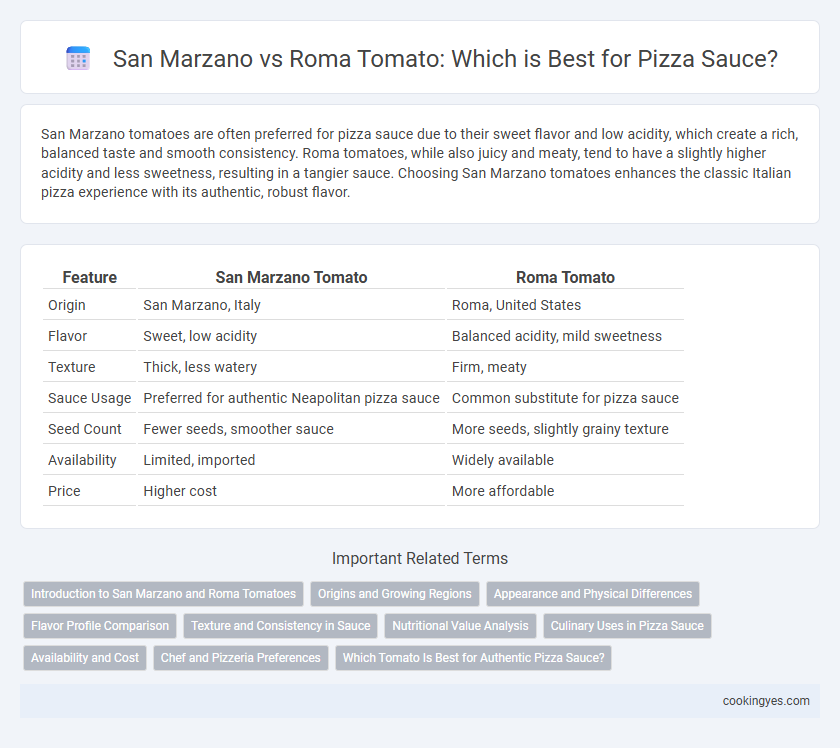San Marzano tomatoes are often preferred for pizza sauce due to their sweet flavor and low acidity, which create a rich, balanced taste and smooth consistency. Roma tomatoes, while also juicy and meaty, tend to have a slightly higher acidity and less sweetness, resulting in a tangier sauce. Choosing San Marzano tomatoes enhances the classic Italian pizza experience with its authentic, robust flavor.
Table of Comparison
| Feature | San Marzano Tomato | Roma Tomato |
|---|---|---|
| Origin | San Marzano, Italy | Roma, United States |
| Flavor | Sweet, low acidity | Balanced acidity, mild sweetness |
| Texture | Thick, less watery | Firm, meaty |
| Sauce Usage | Preferred for authentic Neapolitan pizza sauce | Common substitute for pizza sauce |
| Seed Count | Fewer seeds, smoother sauce | More seeds, slightly grainy texture |
| Availability | Limited, imported | Widely available |
| Price | Higher cost | More affordable |
Introduction to San Marzano and Roma Tomatoes
San Marzano tomatoes, grown in the volcanic soil of Italy's San Marzano region, are prized for their sweet flavor, low acidity, and thick flesh, making them ideal for rich, flavorful pizza sauce. Roma tomatoes, widely cultivated and available, offer a firmer texture and slightly tangy taste, which provides a balanced base for many pizza sauces. Both varieties are plum tomatoes, but San Marzano's distinct terroir and sweetness often make it the preferred choice for authentic Italian pizza sauce.
Origins and Growing Regions
San Marzano tomatoes, originating from the volcanic soil of the Agro Sarnese-Nocerino region near Naples, Italy, are prized for their sweet flavor and low acidity, making them a top choice for authentic Neapolitan pizza sauce. Roma tomatoes, also known as plum tomatoes, are widely cultivated in various regions including California and Mexico, offering a denser flesh and slightly more acidic taste, ideal for thicker, hearty sauces. The distinct terroir of San Marzano fields contributes to their unique sweetness and texture, distinguishing them from the more commonly available Roma varieties in commercial pizza sauce production.
Appearance and Physical Differences
San Marzano tomatoes are elongated with a smooth, thick skin and fewer seeds, offering a vibrant red color that enhances pizza sauce appearance. Roma tomatoes have a firmer, oval shape with thicker walls and more seeds, resulting in a chunkier texture. The distinct smoothness and slender shape of San Marzano tomatoes provide a more consistent sauce ideal for classic Italian pizzas.
Flavor Profile Comparison
San Marzano tomatoes offer a sweeter, less acidic flavor with a rich, complex taste that enhances pizza sauce depth, making them a preferred choice for authentic Neapolitan pizzas. Roma tomatoes present a more robust, tangy profile with higher acidity, providing a sharper, brighter sauce flavor that stands out on thicker crusts. The balance of sweetness and acidity in San Marzano tomatoes delivers a smoother, more harmonious pizza sauce compared to the bolder, more intense taste of Roma tomatoes.
Texture and Consistency in Sauce
San Marzano tomatoes deliver a smoother, less watery texture with a naturally thick consistency, ideal for achieving a rich, velvety pizza sauce that clings well to dough. Roma tomatoes offer a firmer flesh and moderately thick consistency but tend to release more water, resulting in a slightly thinner sauce that may require additional cooking time to reduce. The choice between San Marzano and Roma tomatoes significantly affects the sauce's mouthfeel and overall pizza quality.
Nutritional Value Analysis
San Marzano tomatoes offer a richer nutrient profile with higher levels of vitamin C and antioxidants compared to Roma tomatoes, enhancing the health benefits of pizza sauce. Roma tomatoes contain slightly more fiber and potassium, supporting digestive health and electrolyte balance. Both varieties provide essential nutrients, but San Marzano's superior antioxidant content makes it a preferred choice for nutrient-dense pizza sauces.
Culinary Uses in Pizza Sauce
San Marzano tomatoes offer a balanced sweetness and low acidity, making them ideal for smooth, rich pizza sauces with a naturally sweet flavor and vibrant red color. Roma tomatoes, known for their dense flesh and fewer seeds, provide a thicker sauce with a slightly tangier taste, which helps create a robust and hearty pizza base. Choosing San Marzano enhances traditional Neapolitan-style sauces, while Roma tomatoes suit thicker, heartier sauces preferred in American-style pizzas.
Availability and Cost
San Marzano tomatoes, prized for their sweet flavor and low acidity, are often more expensive and less readily available due to their protected designation of origin from Italy. Roma tomatoes offer a more affordable and widely accessible alternative, commonly found in local grocery stores and suitable for making pizza sauce with a balanced taste. Choosing Roma tomatoes can reduce costs significantly while providing consistent quality for homemade or commercial pizza applications.
Chef and Pizzeria Preferences
San Marzano tomatoes are favored by many chefs and pizzerias for their sweet flavor, low acidity, and thick flesh, which create a rich, well-balanced sauce ideal for traditional Neapolitan-style pizzas. Roma tomatoes, while less sweet and more acidic, are preferred by some pizzerias for their availability, affordability, and slightly tangier taste that enhances certain pizza sauce recipes. Chef preferences often depend on the style of pizza being crafted, with artisanal pizzerias favoring San Marzano for authenticity and chain pizzerias opting for Roma to meet cost and supply demands.
Which Tomato Is Best for Authentic Pizza Sauce?
San Marzano tomatoes are widely regarded as the best choice for authentic pizza sauce due to their balanced sweetness, low acidity, and dense flesh, which create a rich and flavorful base. Roma tomatoes, while also flavorful and commonly used, tend to have higher acidity and less sweetness, resulting in a tangier sauce with a thinner consistency. The unique terroir of the San Marzano region in Italy contributes to the distinct taste and quality that make San Marzano tomatoes ideal for traditional Neapolitan-style pizza sauce.
San Marzano Tomato vs Roma Tomato for Pizza Sauce Infographic

 cookingyes.com
cookingyes.com